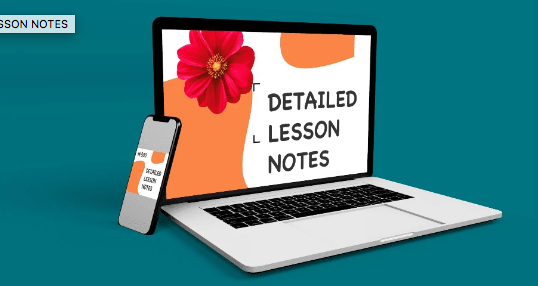First Term English Lesson Note for Primary 6
ACCESS ALL LESSON NOTES
ACCESS ALL QUESTIONS AND ANSWERS
ACCESS ALL WORKSHEETS
ACCESS ALL JOBS ACCESS
ACCESS WAEC QUESTIONS AND ANSWERS
BASIC 6 LESSON PLAN FOR FIRST TERM – ENGLISH LANGUAGE
WEEK: One
CLASS: Basic six
SUBJECT: English Language
TOPIC: Revision
BEHAVIOURAL OBJECTIVES: At the end of the lesson, pupils should be able to revise the previous
topics
BUILDING A BACKGROUND: Pupils are familiar with the revised topics
INSTRUCTIONAL MATERIAL: Pictures, charts and textbook
REFERENCE MATERIAL: Nigeria Primary English Pupils’ Book 6
CONTENT:
REVISION
Change each of the following to indirect speech.
1. ‘Get out’, the teacher yelled.
2. ‘i have seen the new house’, said Akanro.
3. The woman said to her son, ‘kindly fetch me some firewood’
4. ‘Have you seen my pencil?’ the woman asked
Write out the synonyms of the given words below.
1. Concluded
2. Discovered
3. Present
4. Calm
5. Enemy
EVALUATION: Pupils are evaluated thus:
WEEK: Two
CLASS: Basic six
SUBJECT: English Language
TOPIC: Further practice on report making; Grammar: Synonym Writing: Guided composition
BEHAVIOURAL OBJECTIVES: At the end of the lesson, pupils should be able to:
i. Make reports
ii. figure out the synonyms of words
iii. write a guided composition
BUILDING A BACKGROUND: Pupils are familiar with report writing and synonyms
INSTRUCTIONAL MATERIAL: Pictures, charts and textbook
REFERENCE MATERIAL: Nigeria Primary English Pupils’ Book to
CONTENT:
STRUCTURE

GRAMMAR
SYNONYMS
Synonyms are words that are similar in meaning.
Examples:
Huge – Big
Ancient- old
Enemy – foe etc
EVALUATION: Pupils are evaluated thus:
1. write a composition on the topic ‘My Class Teacher’.
2. Replace the underlined words in the following sentences with other words which means the
same from the box. You may use your dictionary.
behave clinic healthy pierced unfortunately gradually hug abandoned be
supportive be loving
1 The children should learn to act like smart pupils. (behave)
2 A healthcare facility for patients should have many doctors and nurses.
3 The man left behind the old car on the street.
4 The knife cut through the soldier’s flesh.
5 Embrace me, please.
6 Good parents should be showing love and affection to their children.
7 We should be showing support or assistance to others in times of trouble.
8 The snake moved bit by bit towards its victim.
9 Unluckily it rained all day on Saturday.
10 Mr Olaolu’s physical condition showed that he was free from disease.
WEEK: Three
CLASS: Basic six
SUBJECT: English Language
TOPIC: Reporting type of essay; Grammar: Noun: Definition and types; Writing: A report of an
incident
BEHAVIOURAL OBJECTIVES: At the end of the lesson, pupils should be able to:
i. Explain a reporting type of essay
ii. Define a noun and mention types
iii. Write a report on an incident
BUILDING A BACKGROUND: Pupils are familiar with nouns and oral form of report
INSTRUCTIONAL MATERIAL: Pictures, charts and textbook
REFERENCE MATERIAL: Nigeria Primary English Pupils’ Book to
CONTENT:
STRUCTURE
REPORTING TYPE OF ESSAY
The purpose of a report is to convey specific information to provide the reader with information. The
purpose of an essay is to show how well you have understood the question and are able to answer it.
A report usually contains a description of events/results of research.
GRAMMAR
NOUN
A noun is a naming word. It is the name of a person, idea, animal, place or things. E.g: Bose, farm,
hospital, ant etc

EVALUATION: Pupils are evaluated thus:
1. What is a noun?
2. Mention the types of noun and give examples
3. Write a report on a traditional festival you witnessed in your village.
WEEK: Four
CLASS: Basic six
SUBJECT: English Language
TOPIC: Pronunciation, stress and intonation practice; Grammar: pronoun: Definition and types
Writing: Features of formal and informal letters
BEHAVIOURAL OBJECTIVES: At the end of the lesson, pupils should be able to;
i. Read with the correct intonation and stress pattern
ii. Define pronouns and mention the types
iii. State the features of formal and informal letters
BUILDING A BACKGROUND: Pupils are familiar with intonation, pronouns and letters
INSTRUCTIONAL MATERIAL: Pictures, charts and textbook
REFERENCE MATERIAL: Nigeria Primary English Pupils’Book to
CONTENT:
PRONUNCIATION
STRESS AND INTONATION PRACTICE
Remember that stress is the force or loudness with which a part of a word is pronounced. Many words
of two syllables come from one-syllable words. For example, the word ‘singer’ comes from the word
‘sing’ and the word ‘enlarge’ comes from the word ‘large’. In these two-syllable words, the stress is on
the syllable of the original word. In the examples below, O and/or capital letters can be used to show
the stressed syllable and o the unstressed syllable.
Here are some more examples:
Nouns and adjectives (Oo) Verbs (oO)
Boy – BOYhood
Own – disOWN
Star – STARdom
Take – reTAKE
friend – FRIENDship
miss – dismiss
Most two-syllable nouns and adjectives have stress on the first syllable, even if they are not formed
from an original one-syllable word. For example, ‘pastor’ is not formed from the original word ‘past’,
but it still has the stress pattern Oo.


EVALUATION: Pupils are evaluated thus:
1. State four features each of a formal letter and an informal letter
2. What are pronouns? Mention four types with examples.
3. Write a letter to your headmaster requesting for a new school uniform.
DON’T STRESS, JUST LET PROFESSIONALS DO THE STRESS, CLICK HERE TO BUY THE COMPLETE LESSON NOTE (WEEK 1-12 WITH PICTURES AND REFERENCES) FOR JUST 1200 NAIRA OR HIT THE WHATSAPP BUTTON BELOW
